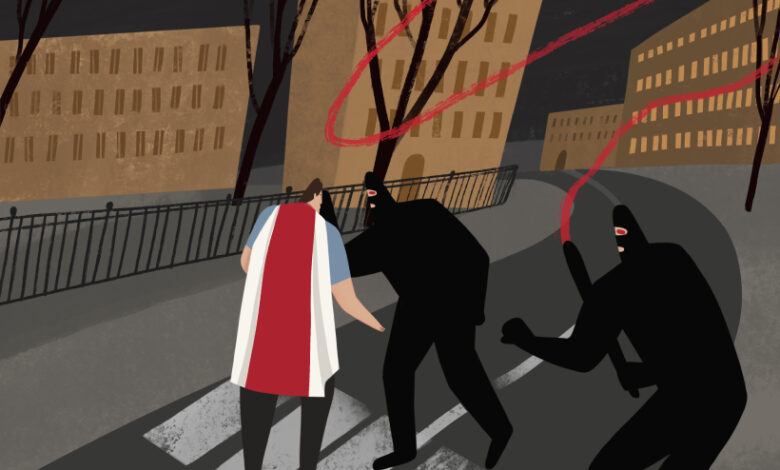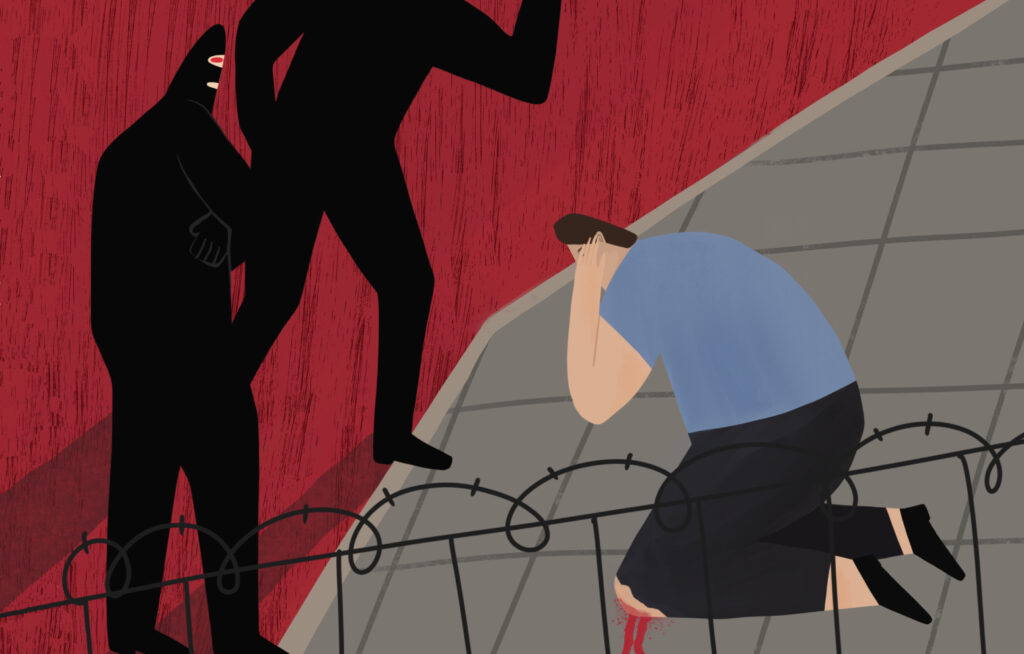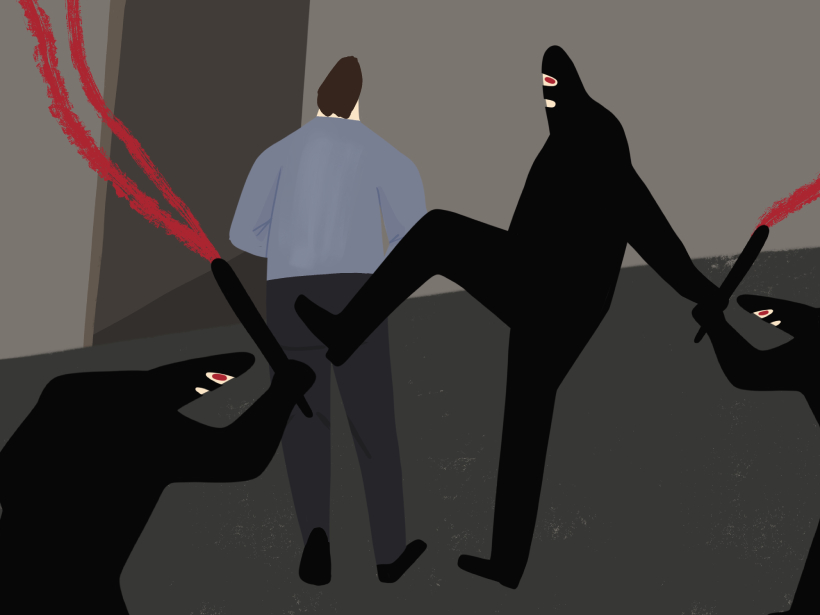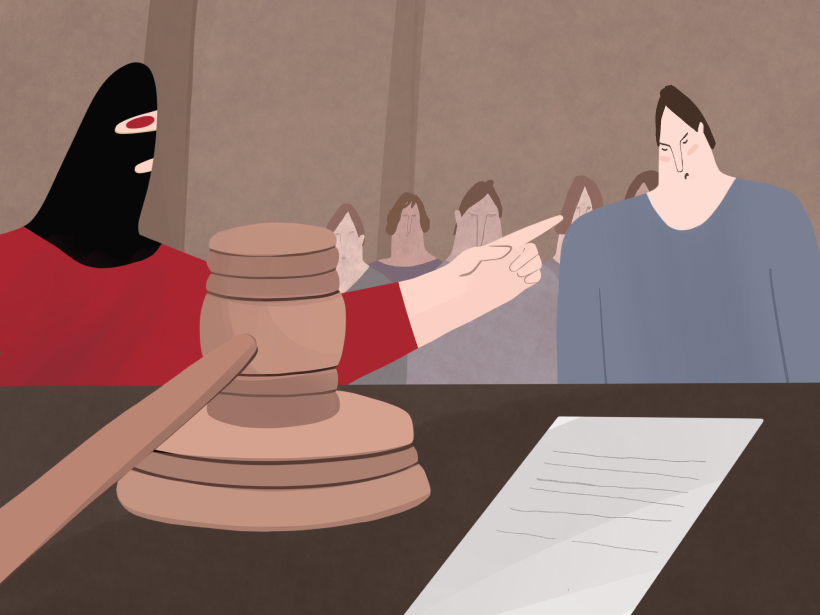Torture and violence in 2020 – Ihar’s story

28 years old, freelancer. “I have decided that I’d rather take to the street and get hit in the head than be ashamed of sitting everything out at home”
If Ihar (not his real name) had known in advance that he would be prosecuted in a criminal case after his very first arrest, he would still have taken to the street. He was detained at one of the Sunday protest marches. Ihar calls his story a “light version” of what happened to people in August 2020. However, his knees are still bothering him after he had to stay in an awkward position while in detention. From the point of view of human rights, Ihar’s story is nowhere near being “light”: why should a man lose 13 days of his life in the Akrestsina detention center for nothing?
“I realized that in any case, someone would go out to protest. I have decided I would rather take to the street and get hit in the head than be ashamed of sitting everything out at home. But I did not know that so many people around me were against all this. It is too bad that now the risks have become exorbitant, and it is unclear what will happen next. Yet, I believe that everything will be fine.”
Ihar saw a different Minsk in August 2020. Minsk was exploding, shooting, fleeing, and filled with people. Ihar was detained at one of the downtown Sunday marches. At one point, a column of people ran into a cordon formed by security forces. Some of the people edged through courtyards and parking lots. Ihar went too.
“When the law enforcers saw people moving behind their backs, they started blocking the neighboring street. Some of the people came close to them. I realized there was nothing to do there, so the guys and I were about to walk away. At that moment, a line of law enforcers parted, and four, maybe five, vans drove into the crowd at high speed. The people scattered. The row of law enforcers stood on one side, and there was a fence on the other side and a high parapet behind the people. Panic ensued. The law enforcers got out of their vans and started grabbing everyone. Those with flags were the first to be detained. I had a flag tied around my neck. I was one of the first to be caught. I tried to somehow leap to the side but got hit in the face at once, confused.” Ihar was led to the van, half-running and bent forward at the waist.
“I think I was also kicked in the chest and thrown to the floor before being taken to the van. They talked rudely and used foul language. They told me to lie down on my knees between the seats, with my head down and hands behind my head. I obeyed. When I did, the driver hit me on the back at least three times with a truncheon or some other object, yelling, ‘Why the f*ck can’t you sit at home!’ He demanded my phone, and I gave it to him. And literally ten seconds later – I heard the commotion but didn’t see it – people were shoved into the van: women, men. Many asked not to be beaten – I heard muffled thumps. I wasn’t beaten anymore, but people were thrown on top of me. That is, they were sitting on me.”
“Kneeling is a real torment. My knees are still bothering me, and I doubt this will stop”

On the way, Ihar took off his white bracelet, which he drew a red stripe on at home, and left it on the floor. He doesn’t know what became of his flag. When the bus filled up, people were taken elsewhere. Just ten more minutes, and they were transferred to a prisoner transporter.
“You couldn’t raise your head, or you would get beaten. When they took me out of the transporter, I saw a row of people in different uniforms and plain clothes. I didn’t see any police at all. Everyone was wearing masks. They lined up in a ‘corridor’ formation and kicked us in the rear to guide us around.”
A tall box without a window in the prisoner transporter was for one person, but another man and a young guy, evidently a father and a son, were put there with Ihar. There was not much air, but it was bearable in there. The next stop was a police department. People learned about this later; no one considered it necessary to inform them where they were being taken on the way there.
“People were brought out and told to state their first name, last name, place of work, and whom they lived with. Then they led me out, too. A man with a small camera that looked like a GoPro stood in the transporter.”
People sorted people
Two rows of security officers – some in police uniforms, but more in plain clothes – met the detainees in the police station courtyard: “Run that way! Don’t look!” The detainees were sent to a garage, which looked like a hangar.
“People were on their knees, resting their foreheads on the concrete floor with their hands behind their backs. They showed me a place and demanded I do the same. They also told me to take out all the stuff from my pockets and place it next to myself. I have had knee problems since childhood. Standing in that position was true agony. My knees are still bothering me, and I doubt this will stop.”
Ihar did not raise his head or try to look around. Those who looked up and asked questions were beaten. Ihar didn’t see any women in kneeling positions. He surmises that they sat on chairs not far away.
“A guy next to me had groaned for about 20 minutes. Finally, someone approached him, and he explained that he had a herniated spine, and it was excruciating for him to stand in that position. They allowed him to change his position. I heard a lot of very unpleasant things. For example, the father from that tall box was severely pressured: ‘Why the f*ck did you take your son with you? If you have nothing to lose, why are you ruining his life? You will all get nine years in prison. What an asshole you are…’ and so on. Every other word was obscene, even when these pieces of work were talking to each other. The conversation with the detained people boiled down to telling them that they were unworthy bad people, that they had already done enough to warrant a lengthy sentence, that there was nothing they could do about it, and that things would only get worse. So power through it, keep quiet, and suffer.”
“Every other word was obscene, even when these pieces of work were talking to each other”
Ihar half-sat half-lied on the concrete floor for about an hour. In the meantime, the security forces (Ihar saw officers from the Main Directorate for Combating Organized Crime and Corruption, and riot and regular police) were sorting people. The people from the Main Directorate for Combating Organized Crime and Corruption were in charge.
“They made the detainees line up in several rows. One had a different fate depending on what row they were in. I was dragged up by the scruff of my neck. Two men in plain clothes and masks looked at me. I am pretty sure one of the two was among those law enforcers who broke windows in the O’Petit Café. They met my gaze, and that law enforcer said, ‘Yes, that’s him, I remember him by his T-shirt.’ They threw me in a separate row with only three other people.”
At this point, Ihar had to look for his phone in a pile of “confiscated” phones. He decided to say that his phone wasn’t there.
“I spent another fifteen minutes on my knees, and then someone ordered a police officer to take me in for interrogation. He picked me off the floor and started pushing me aggressively. As soon as we entered the police station, he became more mellow and even apologized. He asked why I was limping.”
The criminal investigation office was Ihar’s next destination. The interrogation itself slipped Ihar’s memory due to stress. Ihar only remembers that he admitted to attending the protest march.
“He typed something up, showed the report to me, and made me sign it. Well, it’s not that he forced me; he just said, ‘Sign it’, and I did. He took me out of the office and said: ‘What are you doing? When asked, say that you did not take part in anything, or they will pin some crap on you.'”
Ihar had to wait on the first floor again. Only this time, he was forced to stand facing the wall. Gradually, the long corridor filled with people. Two more hours – and Ihar entered an assembly hall to witness a police report on his alleged administrative offense being written.
“They sat me with some guy who looked about 20 years old. He handed me a piece of paper that read: I participated in a protest march, shouted this and that – in general, the standard plot, everyone was given this. I said I had not participated in anything and wouldn’t sign the report. ‘If you don’t sign it, it will only get worse. Write that you disagree with the report then,’ the guy said. I wrote.”
Even though Ihar had not yet been convicted, they took finger and footprints, saliva samples, and photographed him from different angles. Then, they threw him into a cell at the police station. Five people detained a couple of hours earlier were already there. People were brought in, people were taken away, and at some point, quite a few gathered in the cell. The ventilation system did nothing to help with how stuffy the cell was. There was no water, and a bottle had to be used instead of a toilet. A prisoner transporter to Akrestsina arrived around 2 am. Ihar found himself in the tall box again, with only two companions this time.
A chameleon Akrestsina

“They didn’t beat me in the Akrestsina detention center. And I didn’t see or hear anyone else being beaten that day. They lined us up along the corridor walls. They would scold us a lot when we did something wrong. For example, as it turned out, one is not allowed to stand across the cell entrance. But how would we know this if no one warned us? They have fun punishing people for violating rules that weren’t clearly conveyed to them.”
Ihar ended up in a four-person cell in the morning. He was the sixth person there, along with another fellow sufferer. Two people detained the day before gave up their beds to the newcomers. In the morning, Ihar and his companion were transferred to another cell, where they had their own bunks. At that time, the cells were not overcrowded. Everyone had a mattress and bedding. People were even allowed to sleep during the day.
In general, the Akrestsina detention center staff didn’t pay much attention to what the detainees were doing as long as they didn’t cause any trouble. The staff gave prisoners packages from their relatives once every three days with no issue. The detainees had crossword puzzles, books from their relatives, and magazines, in particular, Nasha Historyia [a historical magazine], and Ihar read a lot. The detainees went for a walk outside twice, each walk was 15 minutes in the courtyard. Such conditions aren’t typically associated with the Akrestsina detention centers, are they?
“While I was writing a draft of the complaint regarding the court verdict, a cell inspection happened. When I went back in, the draft was gone”
But even then, the Akrestsina staff had their own brand of “entertainment”: every morning, detainees were led out of their cells, frisked, and their cells were turned upside down. The staff tried to exert moral pressure on the detainees.
“You could hear how the guards were trying to fake a rough voice to make some kind of impression on you, but that trasianka [a mixture of the Belarusian and Russian languages] accent… That guard would think he was a tough guy, but he just looked ridiculous. I don’t know what kind of life they have had and how they were brought up that they behaved like that.”
A trial via Skype was held on Monday. Everything went according to the typical routine: a witness wearing a balaclava claimed to have detained Ihar, but the place and time of detention did not have anything in common with the real ones. The witness also made a mistake in describing Ihar’s clothes. Ihar was sentenced to 13 days of administrative detention. Ihar “witnessed” many verdicts being passed in the Akrestsina detention center: a desk where trials took place was right in front of his cell. One trial, in particular, was memorable. A detainee, running away from security forces officers, was hit by a car and broke his leg. He had sat with a broken leg in the Akrestsina detention center for three days until he was finally taken to the hospital to have a cast put on it. His lawyer found a CCTV video showing the accident that completely refuted the witnesses’ claims. Then the judge decided not to look at these materials and not include them in the court case.
While in the Akrestsina detention center, Ihar attempted to appeal the verdict. The appeal must be submitted to the court within ten days of the verdict.

“I was writing a draft first. I didn’t quite finish it – there was a cell inspection. When I went back in, the draft was gone. Then I finished writing the appeal and spent two days trying to get it sent. It was sent at last, but too late, and was no longer legally valid.”
But the main thing in the Akrestsina detention center was communication. Ihar’s two cellmates in the four-bed cell changed almost every day. Despite having only a brief acquaintance, Ihar is still in touch with some of his former cellmates. However, most of them are already in Poland and Ukraine.
“One of my cellmates was either a stretch ceiling specialist or worked in kitchen renovations. He left home with his toolbox – they took him away from the apartment complex courtyard, threw the tools out, and left his car open. They took him straight to Akrestsina in his work uniform. Another man in the cell at first did not attempt to communicate with us whatsoever. I thought he was a yabatska [the slang word “yabatska” is a portmanteau of the word ‘ya’ (‘I am’) and ‘batska’, which means ‘father’ in Belarusian and is believed by some to be a common nickname for Lukashenko in Belarus; literally ‘I am the father’. Coincidentally, the word ‘yebat’ means ‘to f*ck’ in Russian. The term ‘yabatska’ refers to staunch supporters of Lukashenko and his regime]. But then I realized that he was under a lot of stress, and his mental state suffered a little bit due to this. I think he felt as if he were put in a cell with people who wanted to elicit information from him.
He started having panic attacks. One night he shouted his name and cell number out the window and said that he was in danger. We tried to calm him down – to no avail. We started pressing the panic button – half an hour later, a prison guard came and said: ‘I’ll get some valerian root.’ He left and did not return. We calmed the man down and put him to bed ourselves. On the day of my release, the cell was packed: ten people were there. This man started banging his head on the table with all his might. He battered his head. At this point, another guy and I were taken to a separate cell for release. We told a blonde guard that there was a man who needed help. Later, I learned that the man apparently had gotten some help.”
“Another man in the cell did not attempt to communicate with us whatsoever at first. To be honest, I thought he was a yabatska”
One early morning, Ihar was suddenly taken out of his cell, handcuffed, and placed in a civilian car. Law enforcers were sitting on his left and right, and they were very young, “literally schoolkids”. They were completely detached. Where were they taking Ihar? They gave no response. Ihar ended up in one of the Investigative Committee offices in Minsk. There he learned that he had become a suspect in a criminal case.
An investigator asked about Ihar’s lawyer. The question was a pro forma one, and the investigator immediately started coaxing Ihar into not seeking a lawyer’s services: “Well, you know, we will have to call the board, we will have to wait, and it will take a few hours. Do you feel like sticking around all this time? I don’t have that much time either…” A state-appointed lawyer (a good one, by the way) showed up two minutes later. However, Ihar could not communicate confidentially with the lawyer in such conditions. The investigator left the room, but the convoy and a woman who looked like a secretary stayed behind. Ihar managed to send a message to his family through the lawyer.
Ihar spent four or five hours outside Akrestsina in handcuffs. They were only unlocked for him to sign the report. Later, two investigators came to talk to Ihar in the Akrestsina detention center. It looked like they wanted to get more information. It was with this moral burden that Ihar spent the rest of his term of detention. The criminal investigator would call him a couple more times. And then – the silence of the unknown.
The prison nurse said: “If you can breathe, we won’t give you anything”
Ihar’s health has been a concern since his detention. He even tried to get medical help in the Akrestsina detention center.
“My ribs and back hurt a lot. I could hardly breathe properly as I had a herniated spine. A nurse examined me and sort of made a record of my bruises and hematomas. She said: ‘If you can breathe, we won’t give you anything.'”
It hurt so much that Ihar wondered if his ribs were broken and went to a doctor after his release. It turned out he had a compressed nerve in his back. But while his backache eventually went away on its own, Ihar admits he is afraid to go to a doctor about his knee problems. His knees are swollen and cause discomfort. Yet, Ihar’s psyche stood the test.
“When I went to get a certificate that I had served an administrative detention sentence, volunteers were still standing out there. The psychologist almost made me talk to them. She said: ‘Right now, you feel fine, but time will pass, and all your issues will surface.’ She gave me exercises to do. Well, after a week, my condition somewhat worsened, but then it went away on its own. You know, in early August I was in scuffles and saw people being maimed and beaten up. People were literally being murdered. I bandaged a young man’s leg on August 9: a stun grenade exploded nearby, slicing his shin open. When a prisoner transporter ran over another dude, my heart sank. I already realized that I got off way lighter than others, and there was nothing to be afraid of. However, I am worried for my family.”
“I pondered what had to happen for me to say, ‘That’s it, I’m leaving.’ I couldn’t think of any such reason”
“One’s state of mind tends to adapt. I have been running through all sorts of tough options in my head – I have somehow come to terms with the situation. I thought to either leave altogether or live with this here. More and more people are leaving with every passing day. It is scary: who is going to stay here? I even pondered what had to happen for me to say, ‘That’s it, I’m leaving.’ I could not think of any such reason. I would like to stay in my country and do good deeds. The sense of injustice I am experiencing more and more gets me thinking: which one is more important, your life or the lives of hundreds of thousands of people? Can you do more than you are doing now?”
Ironically, Ihar says that August 2020 and 13 days in custody made him a little happier. He began to experience moments that used to seem mundane more acutely.
“I lost my naivete and my rose-colored glasses. What did I gain?… I have grown proud of being a Belarusian. I just fell in love with all those people who were around me. Of course, a lot of people dropped out of sight. Not because they are yabatskas, but because they try to stick their heads in the sand, hide, and do nothing. But I have also made many friends in whom I have confidence.”
P.S. Ihar decided against submitting a complaint regarding his beatings to the Investigative Committee.
Author: August2020 project team
Illustrations: August2020 project team
